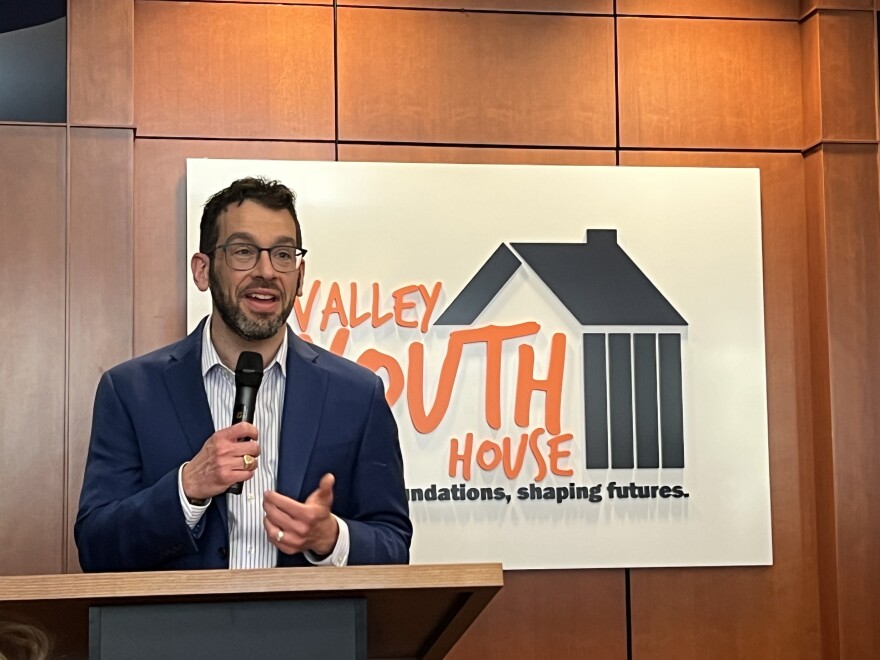BETHLEHEM, Pa. — State Rep. Mike Schlossberg was in a place Friday that he cared not to be.
Schlossberg, who has personally experienced devastating mental health challenges as a youth, stood at a podium at Valley Youth House and spoke his truth about proposed federal budget cuts that would cripple intervention services for at-risk children in the Lehigh Valley.
"We’ve been in a mental health crisis for a number of years and it’s getting worse. We’re at a crisis point and can’t hope to backfill it. If the cuts are enacted, it will be devastating on all of our children."State Rep. Mike Schlossberg, D-132nd District
“I’d like to say it’s wonderful to be here, but it's not,” Schlossberg, a Democrat who represents the 132nd District, said. “I wish we didn’t have to have this.
“But we’ve been in a mental health crisis for a number of years and it’s getting worse. We’re at a crisis point and can’t hope to backfill it.
"If the cuts are enacted, it will be devastating on all of our children.”
A joint news conference of Lehigh Valley-based legislators and health care providers was held to shed light on children’s mental health issues and advocate for continued state and federal funding.
Such funding will let local organizations continue providing life-saving services for local children and families.
As Congress debates budget reconciliation measures, alarm bells should be ringing for anyone concerned about the health and well-being of children, officials said.
'Our biggest obstacles'
Current proposals would force hundreds of billions of dollars in cuts to Medicaid and the Children’s Health Insurance Plan, or CHIP, they said.
The cuts represent far more than abstract numbers on a budget spreadsheet — they threaten the health, development, and future prosperity of more than 37 million children who rely on Medicaid and CHIP for their health care, they said.
"If these cuts go through, its damning of what we are as a society.”State Rep. Mike Schlossberg, D-132nd District
“Our biggest obstacles are insufficient funding and getting sufficient labor supply,” said Michael Slack, chief executive officers of KidsPeace.
KidsPeace is an organization that provides behavioral and mental health services for children, families and communities.
“Mental health resources are routinely underfunded by the state. We must make up the difference with grants or donations — or reduced care.”

Schlossberg, who has been very public about his mental health struggles that began as a child, shared the disturbing data.
“The state does a review every two years,” he said. “Nearly 1 in 4 middle school or high school students reported feeling sad, not worth living or feeling like a failure.
“Thirteen percent said they’d planned suicide, and six percent carried through with it…. In 2023 in the country, suicide was the leading cause of death for ages 13 to 24.
“We now have a federal government targeting our most needed services like mental health training, school-based and community-based behavioral services.
"If these cuts go through, its damning of what we are as a society.”
'Can't turn our backs'
Anne Baum, president of Lehigh Valley Reilly Children’s Hospital, called the proposed cuts to services “unacceptable in our community.”
“We need to take action together,” Baum said. “The demand [for services] continues to rise. We have children showing up every single day [at LVHN] with suicidal ideation and some mental health issues.
"But we don’t have enough services to help serve the children in our valley.”
“Today marks the start of an advocacy issue to reduce the stigma of mental health and a request to add funding and resources so the services don’t go away."Tom Harrington is president of Valley Youth House
Tom Harrington is president of Valley Youth House, which provides preventative support to youths struggling with mental, lifestyle and behavioral health challenges, among other services.
“Today marks the start of an advocacy issue to reduce the stigma of mental health and a request to add funding and resources so the services don’t go away," Harrington said.
“Unfortunately, like a lot of things in life, help does not come free. If we don’t do something now, the costs will be greater later.”
Lehigh County Executive Phillips Armstrong made an impassioned plea to governments to continue funding mental health programs.
“If they don’t, it’s gonna hurt and gonna hurt bad,” Armstrong said.
“We’re here to say, ‘Dammit, I’m not going to take this! I’m not going to let this happen!’
“As a government, we’re here to protect the vulnerable people in our valley, the state, the nation. We can’t turn our backs on these people who may not have a voice.”
'Change this course'
Northampton County Executive Lamont McClure outlined the economic devastation such cuts would have on Lehigh Valley organizations.
“The DOGE cuts codified by Congress in the next budget will devastate us,” McClure said. “It will impact not just our survival, but children’s survival.
“We can all rally and be advocates. Our senators and representatives have the power to change this course of how we treat children in our valley.”Northampton County Executive Lamont McClure
“We can all rally and be advocates. Our senators and representatives have the power to change this course of how we treat children in our valley.”
Thespina L. Godshalk, LVHN administrator of school-based behavioral health, shared encouraging data showing how early intervention in schools reduces the severity of mental health issues.
“In our school-based program, over 80 percent of youth who complete the program feel confident they can use what they learned in therapy to help themselves in the future,” Godshalk said.
“On average, they experience a 20-percent decrease in emotional issues, and their hope rises an average of over 10 percent.”
'I'm telling you it's raining'
Sustaining mental health programs is a reality near to United Way of Greater Lehigh Valley Chief Executive Officer Marci Lesko said.
"Our family survived a suicide loss," Lesko said. "My two sons experienced the loss of their father. I know exactly what it takes to navigate.
"We need support sustainable revenue streams, protect what we have, grow it and provide for our most vulnerable."
“One child wrote to their therapist, ‘You will always be someone I remember in life.' Without you, I don’t think I’d be alive right now.’”11-year-old child in letter to a therapist
Lesko then issues a request.
"If you have dollars tucked away for a rainy day, I'm telling you it's raining," she said. "Donate to these providers to protect children in our community."
Perhaps the most chilling moment of the presentation of the debate between budget ledgers and children’s lives was a short story Godshalk shared about how intervention may have saved the life of a child.
“One child wrote to their therapist, ‘You will always be someone I remember in life,’” she said. “‘Without you, I don’t think I’d be alive right now.’”
“That child was 11.”


